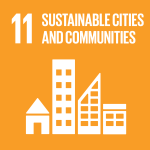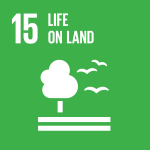September 2021 - Costa Rica has a diverse landscape of coastal lowlands, mangrove swamps, volcanic mountain ranges and thick rainforests. Costa Rica’s tropical climate over its varying altitudes creates many micro-climates each with a distinct ecosystem, agricultural conditions, biodiversity, and wildlife. The country produces a variety of important commodities, such as sugarcane, coffee, and dairy products. According to World Bank statistics, a total of 36 percent of Costa Rica’s land use is attributed to agriculture, and it accounts for 14 percent of the country’s employment. This all makes the country vulnerable to climate change. The slightest changes in precipitation, temperatures and sea-level will affect fragile ecosystems, vegetation distribution and growth, coastal communities, employment, and agri-food chains.
The Government of Costa Rica recognizes the urgent need to fulfil the country’s commitments to promote a carbon-neutral economy, while implementing its climate adaptation agenda - for its land, value chains and people. The country highlighted its priorities to advance sustainable production of agriculture commodities, adopt adaptation-based ecosystems and conserve its biological corridors in the Costa Rica National Climate Change Adaptation Policy (2018-2030). Following Costa Rica’s submission of a revised nationally determined contribution (NDC) to the UNFCCC in December 2020, the country partnered with the FAO and UNDP through the Scaling up Climate Ambition on Land Use and Agriculture through NDCs and National Adaptation Plans (SCALA) programme, with funding from Germany’s International Climate Initiative (IKI). Costa Rica held a two-part inception workshop with the SCALA programme in September 2021 and agreed to prioritize grass-fed beef value chains and to facilitate the design of certification standards to address the impacts of meat production on deforestation that will be delivered over the next five years.

To learn more about how Costa Rica is scaling up its climate ambition in land use and agriculture to meet the targets of its NDC and related climate strategies, the SCALA programme sat down with the Minister of Agriculture and Livestock, Mr. Renato Alvarado to unpack the opportunities and challenges in this process.
***
SCALA: Could you describe some of the key priorities in agriculture and land use that the government has established in its NDC?
Renato Alvarado: Costa Rica is committed to developing efficient, low-carbon agri-food chains for domestic and export markets. In Costa Rica, our key agri-food chains are livestock, coffee, rice, Musaceae (bananas), and cane sugar. Our NDC aims to consolidate an agricultural model that is based on sound approaches in existing policies and strategies. To date, the country has developed a National Low Carbon Livestock Strategy, a National Low-emission Coffee Strategy, and the Low Carbon Banana Strategy, which focus on reducing risks and vulnerabilities in these value chains.
SCALA: What do you consider to be the main barriers to achieving these goals?
Renato Alvarado: So far, we have made progress in developing policies and prioritized implementing transformative action in value chains. Knowledge is a key barrier because transformative change requires an adoption of new technologies. A second barrier is the availability of financing mechanisms that reduce risks for different actors, including investors, in the value chain. Lastly, there is a need for us to strengthen the institutional frameworks that oversee these processes, mainly at the early stages.
SCALA: Costa Rica is part of the 5-year SCALA Programme. How can SCALA support the country in these efforts?
Renato Alvarado: It is a programme that can generate an incentive scheme, such as RECSOIL (a facility for scaling up soil organic carbon-centred sustainable soil management practices) and help mobilize resources to finance the cost of these efforts. In addition, the SCALA programme can contribute to strengthening market access for products developed through low-carbon value chains. Both cases point to the need to increase the capital flow to communities (at the farm level) that adopt technologies and help contribute to scaling up climate action.
SCALA: How has the COVID-19 pandemic affected the work of your ministry? What does it mean for your climate agenda?
Renato Alvarado: This pandemic has been a huge challenge. However, we managed to keep the value chains in operation and reported growth in agricultural exports, while still maintaining adequate levels of supply to the national market during these challenging times. The pandemic has shown how valuable the agriculture sectors are and demonstrated the resilience of our producers. We had determination amid the pandemic to fulfil our national climate work plans.
***
Costa Rica’s agriculture and land use sectors are vital to its economy, employment, and food security. This has become increasingly evident during the global pandemic. Costa Rica has been an early champion of climate action through its efforts in forest conservation that began in the nineties. According to the FAO State of the Worlds Forest 2020 report, the country has achieved 52.4 percent of forest coverage, with a total carbon stock of 804,593,099 tons – more than half of which is underground. Costa Rica’s updated NDC reaffirms its commitment to becoming a carbon neutral economy in 2021, as a culmination of its pre-2020 climate actions.
The SCALA Programme is helping Costa Rica achieve these goals, which will require transforming how the agriculture and land use sectors operate and incorporating adaptation and mitigation measures. In addition to the support on soil management practices, SCALA in Cosa Rica will support the resilience of family farmers to cope with pathogens, so they have the resources to invest in sustainable low-carbon practices. The country is currently developing a road map for its National Adaptation Plan and aims to strengthen conservation initiatives and expand its environmental services payments program to include ecosystem-based adaptation. Costa Rica continues to promote renewable energies, stronger environmental management practices through agro-forestry systems and watershed management, as well as tools for municipal-level land use planning to reduce the long-term vulnerabilities of its population and enhance its food security.



